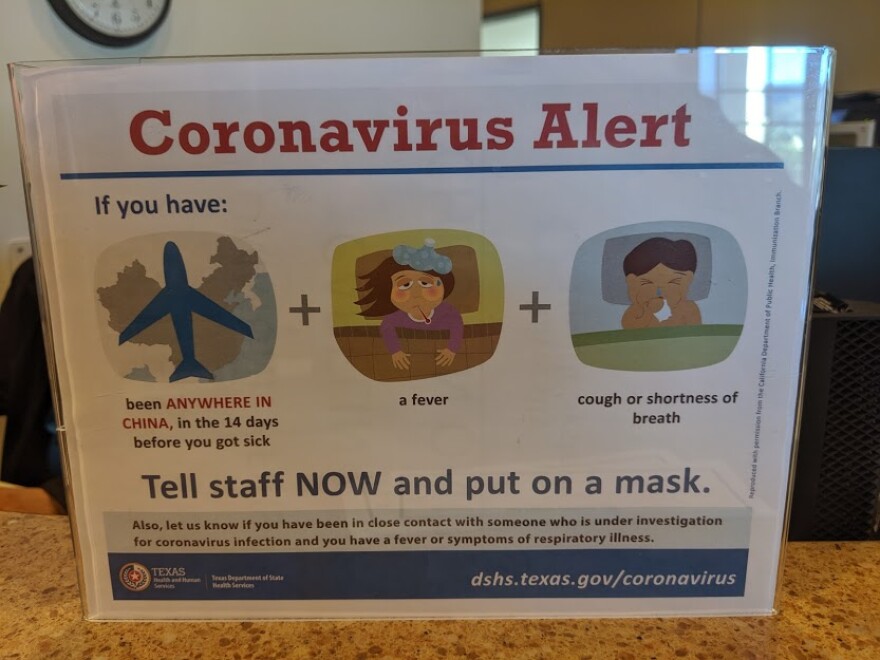The first case of COVID-19 in the United States not linked to travel or contact with someone known to have the virus has been confirmed in California. This is what the Centers for Disease Control and Prevention warned about last week, and again Tuesday: Community spread of the novel coronavirus in the United States.
CDC Director of the National Center for Immunization and Respiratory Diseases Dr. Nancy Messonnier urged localities to prepare, saying, "It's not so much a question of if this will happen anymore, but more really a question of when it will happen — and how many people in this country will have severe illness."
Is San Antonio ready?
Appearing Wednesday on TPR’s The Source, Mayor Ron Nirenberg said yes.
"We are as prepared a city in the nation based on our teamwork with STRAC," Nirenberg said.
STRAC is the Southwest Regional Advisory Council. It’s one of 22 regional advisory councils in Texas designated by the Department of State Health Services to develop, implement and maintain the regional emergency healthcare system. Its focus is pretty specific, according to STRAC executive director Eric Epley.
"Trauma patients: If you’re in a car wreck or shot or fall out of a tree,” Epley said. “Cardiac patients: If you have a heart attack. Stroke patients. The regular emergency healthcare system."
The agency does that for a 22 county area of South Texas, a region the size of West Virginia, and Epley said it's gotten pretty good at emergencies.
"So, one of our other jobs is to manage the disaster response for healthcare," he added.

There are 74 hospitals in STRAC’s network. It also oversees emergency response plans for air medical providers and more than 70 EMS agencies.
Epley said STRAC drills various agencies for disaster preparedness, including infectious diseases.
"We’ll bring the hazmat guys, we’ll bring the special operations unit from the first department, and work directly with the preparedness staff and the emergency department staff and walk through literally step by step by step in slow motion, a little bit like a football team, you run the play slowly and speed it up and speed it up," Epley explained.
It was STRAC that called on Methodist Hospital Texsan in San Antonio to care for the first person who tested positive for COVID-19 in the city. It was an evacuee from Wuhan, China, who had been quarantined at Joint Base San Antonio - Lackland.
Chief Medical Officer Dr. Paul Hancock said Methodist Texsan was and remains ready for patients who need specialized care for infectious diseases.
"We have isolation rooms that are available, we have the personalized protective equipment that is necessary, and we have staff that are familiar in the use of the personalized protective equipment," Hancock said.
The personalized protective equipment will be key if this virus spreads. It includes impervious, plastic gowns and N-95 face masks, which are nothing like the masks you can buy at the store. Health care workers also need eye protection and gloves. They have a strict protocol for putting that gear on and taking it off.
"We call that donning and doffing the equipment, and not only do we follow that process very closely,” Hancock said. “We also have another staff member observing the caregiver putting it on and also observing the caregiver removing the equipment."
STRAC's Eric Epley says RMOC — the Regional Medical Operations Center — has been partially activated throughout the COVID-19 quarantine at Lackland.
"RMOC is where hospitals, public health, our EMS colleagues, our air medical colleagues, Bexar County Medical Society, the UT Health Science Center… all of those people come together physically, in one place," Epley said.
STRAC activates RMOC during disasters that require an emergency medical response.
"It’s worked well for us during the last 15, 20 years with hurricanes, but it also worked well with H1N1, it worked well with Ebola, and it’s working really well for COVID-19," Epley said.
That's the thing about disasters. They happen. And infectious diseases happen, too. They always have, and Dr. Hancock at the Methodist Hospital System says they always will.
"Hopefully this one will pass soon, but next year or the next year or the next year there will probably be something else and we’ll be prepared for that as well," Hancock said.
Worldwide, more than 82,000 people have been infected with COVID-19.
Bonnie Petrie can be reached at Bonnie@TPR.org and on Twitter at @kbonniepetrie.




